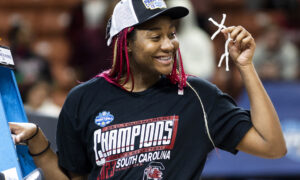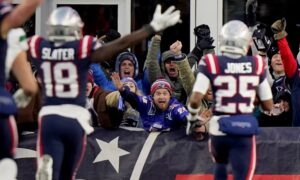
In 1988, UMass, a program that had historically found itself at the bottom, took a calculated gamble. They decided to offer John Calipari, who was untested at the time, his initial opportunity as a head coach.
UMass appreciated Calipari’s trait, which his more sympathetic critics referred to as “shrewdness.” His ability to recruit talented players who were willing to prioritize winning over their egos was exactly what UMass required.
Coach Cal demonstrated his readiness to compete against any team, at any given time and in any location.
Certainly, it is crucial for his players to exhibit astuteness on the court in order to resurrect an A-10 team that drastically plummeted to the lowest rank within the conference. Furthermore, off the court, Coach Cal himself must demonstrate an equal level of shrewdness.
The Calipari recruiting approach
Some may argue that John Calipari’s recruitment strategy is a result of taking over a struggling mid-major program, while his detractors view it as a defining characteristic of his career.
Calipari pursued the top players whom other teams overlooked, not because they lacked skill, but because they were deemed as potential off-court risks.
Calipari was indifferent; as long as you were capable of playing, he was interested in you.
Motivation and foresight
Calipari’s ability to motivate is acknowledged by his coaching friends, former players, and even his harshest critics. UMass was drawn to their coach’s vision, seeing the immense potential it held. If he could successfully recruit even a fraction of the talented individuals he fervently promised, the Minuteman would experience a resurgence.
Lou Roe was the first significant recruitment triumph for Coach Cal, symbolizing his prowess in navigating the challenging landscape. Hailing from a tough area in Atlantic City, basketball provided Roe with an opportunity for a better life, and Calipari skillfully convinced both Roe, his parents, and his friends to believe in his vision.
In 1991, Roe began his freshman year at Calipari’s Minuteman, and their team achieved a significant milestone by winning the A-10 for the first time in their history. The fans were particularly thrilled as they witnessed the team’s remarkable Cinderella journey in the NCAA tournament, although it concluded with a devastating defeat against Kentucky.
Despite the outcome, that run had a profound impact and altered everything.
Switching things up
Although Roe played a crucial role in Amherst’s turnaround, it is Marcus Camby who truly epitomizes Calipari’s UMass legacy. Hailing from Hartford, Connecticut, Camby’s exceptional talent propelled the Minutemen to three consecutive years in the AP Top 10.
When Camby joined Lou Roe’s team during his junior season, he had the opportunity to witness the influence of Coach Cal on a player. Roe exhibited tremendous determination in his playing style – he excelled in rebounding, attacking the rim, passing, and even fouling. These same qualities became synonymous with Camby’s game as well. Embracing the “refuse to lose” mentality, Camby transformed into a highly influential figure in the world of basketball.
Despite only scoring two points, his influence on the game was undeniable as he completely dictated the action. Not only did he anchor the team, but his teammates Edgar Padilla, Donta Bright, Dana Dingle, and Tyrone Weeks exhibited exceptional ball movement and defensive prowess.
During the mid-90s, the Minutemen possessed the ability to fearlessly take on any formidable opponent in any arena and exhibit their unwavering resilience, precision, and self-assurance. In the year 1995, during Camby’s last season, UMass dominantly triumphed over other teams nationwide, showcasing their indomitable spirit and determination, all inspired by Calipari’s unwavering belief in refusing to accept defeat.
The legacy of the mid-90s Minutemen
There is no denying the immense success of the Calipari era at UMass, which spanned from 1988 to 1995. During this time, the team achieved an outstanding record of 173-91, captured five A-10 championships, made five NCAA appearances, and most notably, fostered a sense of unity within the 95-96 Minutemen that resulted in some of the most exceptional team basketball ever witnessed by many.
Nevertheless, to numerous individuals, that particular year was considered a stain on the program. Camby succumbed to the allure of bribes and questionable “gifts” presented by agents. Consequently, the team’s Final Four appearance was annulled, resulting in the school forfeiting more than $150,000. Moreover, Camby departed for the NBA, while Coach Cal decided to pursue a head coaching position with the NBA’s New Jersey Nets, thus concluding their tenure at the university.
The magnificent circus had departed from the town.
In retrospect, considering the controversy that caused Memphis to lose a Final Four opportunity in 2007-08, it becomes difficult to exempt the head coach from responsibility. It seems evident that the coach, at the very least, knowingly deceived others and, at worst, severely mishandled the impressionable young men under his guidance.
It is important to highlight that Calipari has never faced any accusations or penalties from the NCAA regarding his actions at UMass and Memphis. The documentary “One and Not Done” portrays him as a surprised individual who couldn’t fathom his players’ actions. Now, the only remaining decision is whether to believe Calipari or not.
There is substantial debate surrounding this matter, but when it comes to the product he presented in court, there is little room for disagreement.
During the mid-90s, the UMass Minutemen were an exceptional team on the field. Their determination to win was unwavering, resulting in very few losses.






